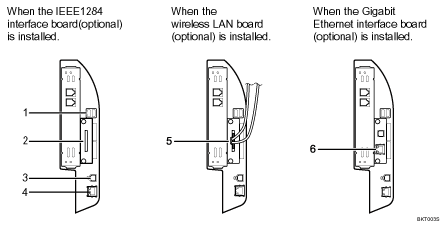


  |  | ||
This section explains how to identify the machine's interface and connect the machine according to the network environment.
![]()
|

USB Host Interface
Port for connecting the USB cable. Use this to connect a digital camera or similar device to the machine.
IEEE 1284 port (optional)
Port for connecting the IEEE 1284 interface cable.
USB 2.0 port
Port for connecting the USB2.0 interface cable.
10BASE-T/100BASE-TX port
Port for connecting the 100BASE-TX or 10BASE-T cable.
Wireless LAN port (optional)
Port for using the wireless LAN
Gigabit Ethernet port (optional)
Port for using the 1000BASE-T, 100BASE-TX, or 10BASE-T cable
![]()
You cannot install these two options at the same time: IEEE 1284 interface board, wireless LAN board.